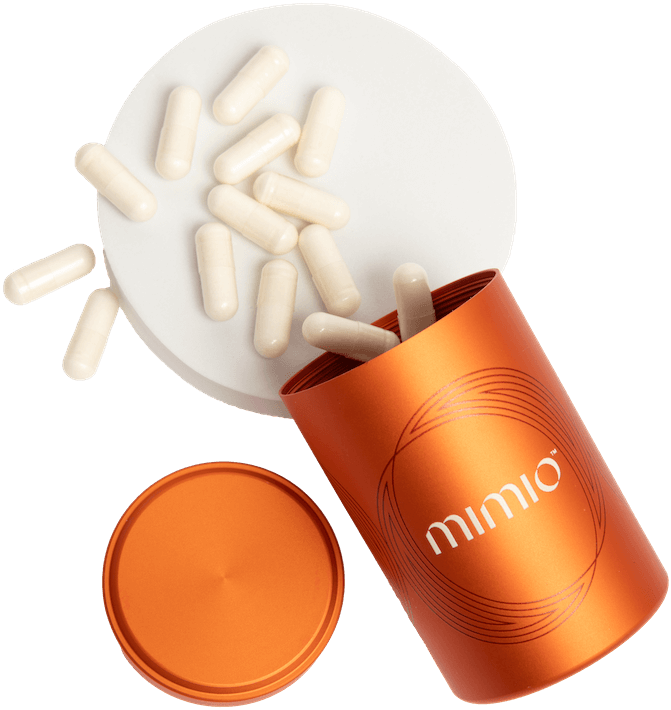Metabolism. It's a word we hear a lot, especially when it comes to discussions around weight, energy, and aging. But what exactly is metabolism, and when does it start to slow down? If you’ve ever wondered why it seems harder to shed those extra pounds as you age, or why your energy levels aren’t what they used to be, you’re not alone. Let’s dive into the science behind metabolism and understand how it changes over time.
Understanding Metabolism
Metabolism refers to the chemical processes that occur within a living organism to maintain natural bodily functions. It’s how your body converts what you eat and drink into energy. Even at rest, your body needs energy for vital functions such as breathing, circulating blood, adjusting hormone levels, and growing and repairing cells. This process involves two main components: anabolism (building up) and catabolism (breaking down).¹
The Role of Basal Metabolic Rate (BMR)
Your basal metabolic rate (BMR) is the number of calories your body needs to accomplish its most basic (basal) life-sustaining functions. Think of BMR as the energy you’d need if you stayed in bed all day. Factors that influence BMR include age, gender, weight, and muscle mass. Generally, people with more muscle have a higher BMR because muscle tissue requires more energy to maintain than fat tissue.
When Does Metabolism Start to Slow Down?
A common belief is that metabolism slows significantly as you age, but the reality is more nuanced. Here’s a closer look at how metabolism changes throughout different stages of life:
Childhood and Adolescence
During childhood and adolescence, metabolism is at its peak. This period is characterized by rapid growth and development, which requires a substantial amount of energy. Teenagers, in particular, experience high metabolic rates due to growth spurts and their increasing muscle mass.
Twenties and Thirties
Metabolism generally remains high in your twenties, largely due to higher levels of physical activity and muscle mass. However, by the late twenties to early thirties, you may start to notice a slight decrease. This decline is usually gradual and often influenced by lifestyle changes, such as reduced physical activity or changes in diet.
Forties
Once you hit your forties, the rate at which your body burns calories starts to decline more noticeably. This can be attributed to several factors, including hormonal changes, loss of muscle mass, and a decrease in physical activity. For women, menopause can also contribute to metabolic changes.
Fifties and Beyond
In your fifties and beyond, the slowdown in metabolism becomes more pronounced. Muscle mass tends to decrease with age, a condition known as sarcopenia, and this loss of muscle further reduces BMR. Additionally, lifestyle factors, such as a more sedentary lifestyle and changes in diet play a significant role in this metabolic slowdown.
Factors Influencing Metabolism
While age is a major factor in metabolic changes, several other elements, of which you have more control, can influence how quickly or slowly your metabolism functions:
- Muscle Mass: More muscle mass means a higher BMR. Strength training can help maintain or increase muscle mass, even as you age
- Physical Activity: Regular exercise boosts your metabolism both during and after your workout
- Diet: Certain foods can temporarily increase your metabolism, such as those high in protein, which require more energy to digest
- Hormonal Balance: Hormones play a crucial role in regulating metabolism. Imbalances, such as those seen in thyroid disorders, can significantly impact metabolic rate
- Sleep: Poor sleep can negatively impact your metabolism and lead to weight gain
Tips to Boost Your Metabolism
While some aspects of metabolic slowdown are inevitable, there are several strategies you can adopt to help maintain a healthy metabolism as you age:
- Strength Training: Incorporate resistance exercises into your routine to build and maintain muscle mass²
- Stay Active: Engage in regular physical activity, including both cardio and strength training³
- Eat Protein-Rich Foods: Protein has a higher thermic effect than fats or carbohydrates, meaning your body uses more energy and burns more calories digesting it⁴
- Stay Hydrated: Drinking water can temporarily boost metabolism. Aim for at least 8 glasses a day⁵
- Get Enough Sleep: Ensure you get 7-9 hours of quality sleep per night to support metabolic health⁶
- Manage Stress: Chronic stress can lead to hormonal imbalances that negatively affect metabolism⁷
To help support your metabolic health, consider exploring Mimio’s Daily Biomimetic Cell Care. Our scientifically-formulated supplement is designed to activate the benefits of fasting and support your body’s natural metabolic processes. By incorporating natural bioactive molecules, Mimio can help enhance your energy levels, mood, and overall metabolic health, even as you age.
Conclusion
While it’s true that metabolism slows down as we age, the decline is gradual and can be managed with proactive lifestyle adjustments. By understanding the factors that influence your metabolic rate and taking proactive steps to maintain muscle mass, stay active, and support your body with the right nutrients, you can help keep your metabolism functioning optimally regardless of age.
Remember, age isn’t a guaranteed metabolism eraser. With the right approach, you can continue to feel energetic and healthy well into your later years. And for that extra boost, consider incorporating Mimio’s innovative supplements into your daily routine to support your metabolic health naturally and effectively.
References
¹ McArdle, W. D., Katch, F. I., & Katch, V. L. (2015). Exercise Physiology: Nutrition, Energy, and Human Performance. Lippincott Williams & Wilkins.
² Phillips, S. M., & Winett, R. A. (2010). Uncomplicated resistance training and health-related outcomes: evidence for a public health mandate. Current Sports Medicine Reports, 9(4), 208-213.
³ Warburton, D. E., Nicol, C. W., & Bredin, S. S. (2006). Health benefits of physical activity: the evidence. Canadian Medical Association Journal, 174(6), 801-809.
⁴ Westerterp-Plantenga, M. S., Lemmens, S. G., & Westerterp, K. R. (2012). Dietary protein - its role in satiety, energetics, weight loss and health. The British Journal of Nutrition, 108(S2), S105-S112.
⁵ Boschmann, M., & Steiniger, J. (2003). Water-induced thermogenesis. The Journal of Clinical Endocrinology & Metabolism, 88(12), 6015-6019.
⁶ Knutson, K. L., Spiegel, K., Penev, P., & Van Cauter, E. (2007). The metabolic consequences of sleep deprivation. Sleep Medicine Reviews, 11(3), 163-178.
⁷ McEwen, B. S. (2008). Central effects of stress hormones in health and disease: Understanding the protective and damaging effects of stress and stress mediators. European Journal of Pharmacology, 583(2-3), 174-185.



